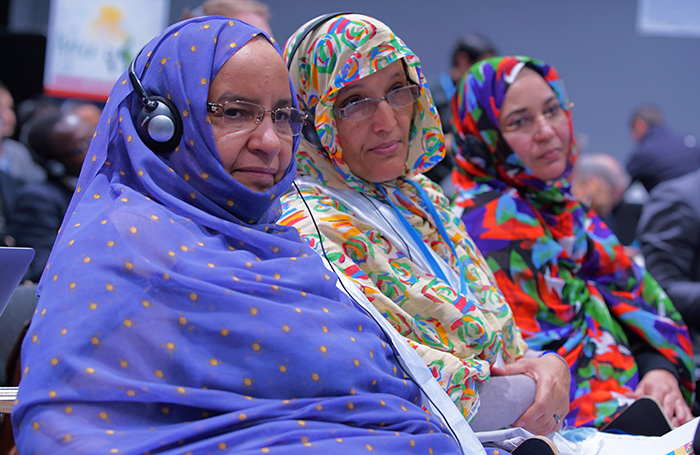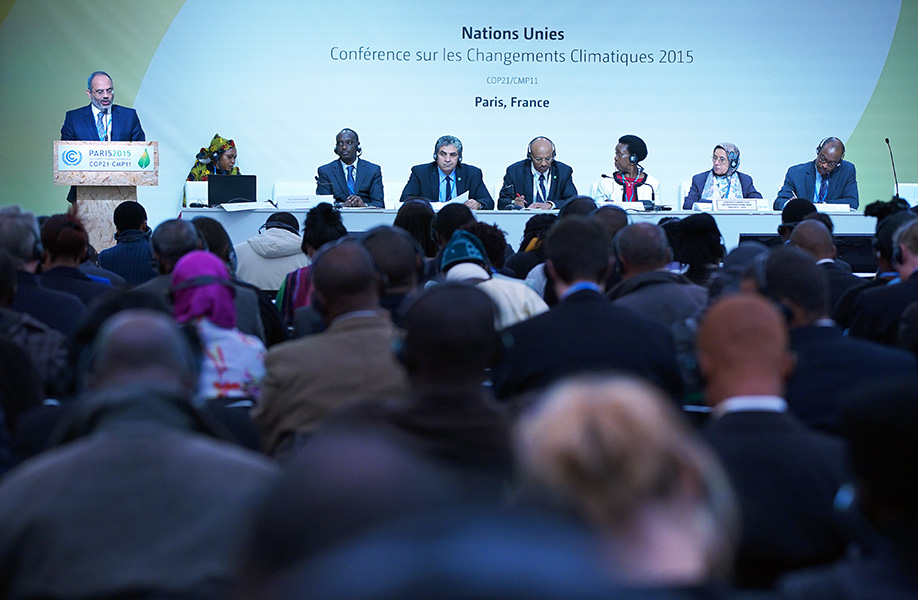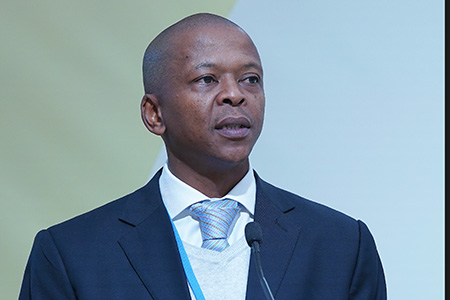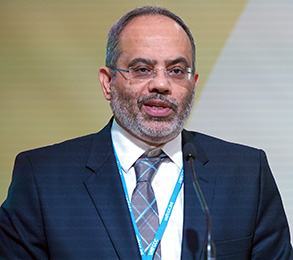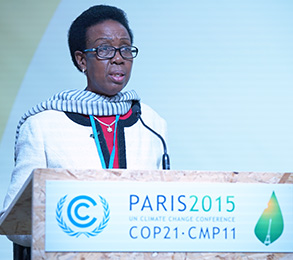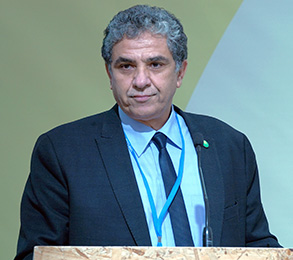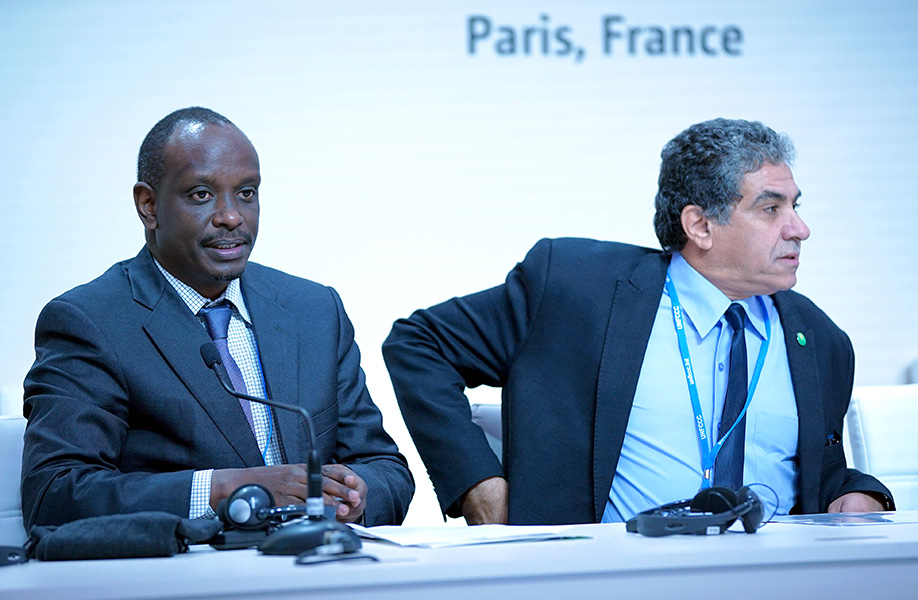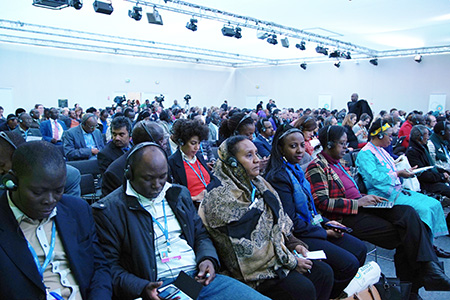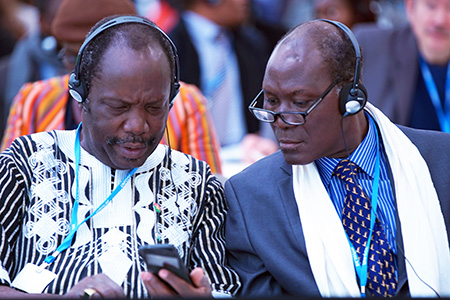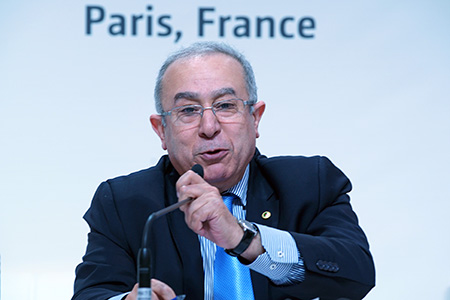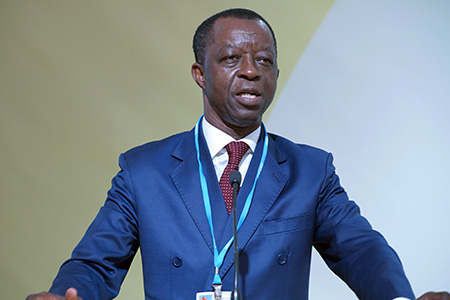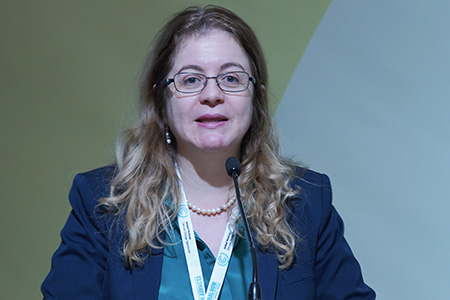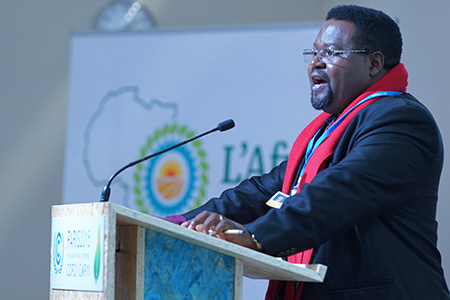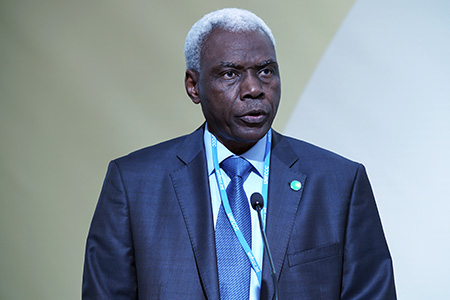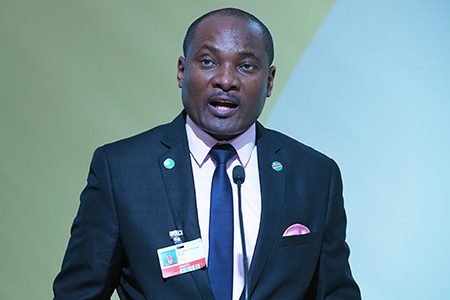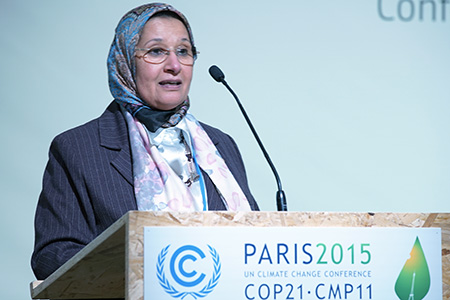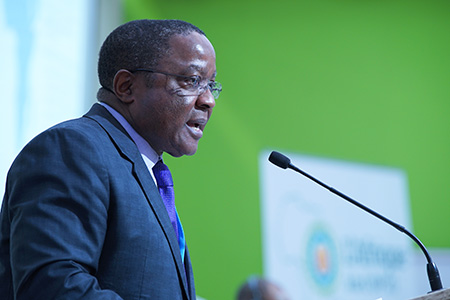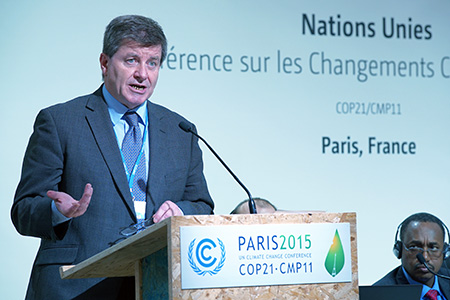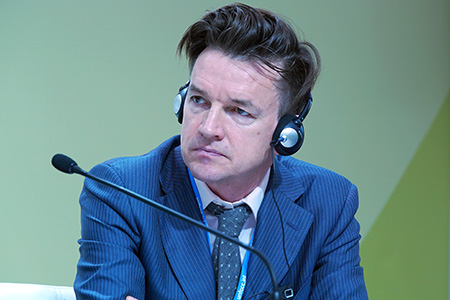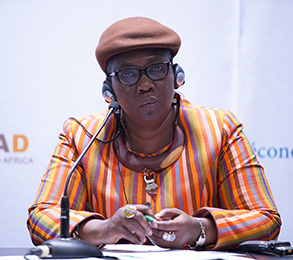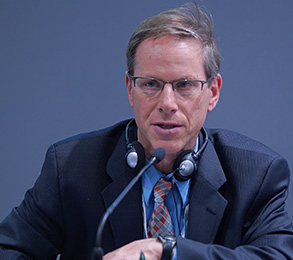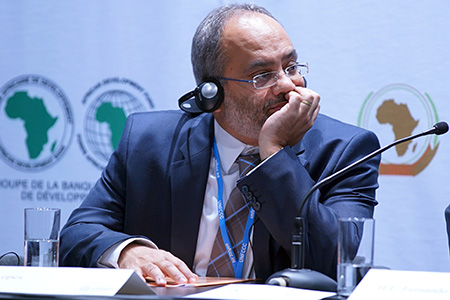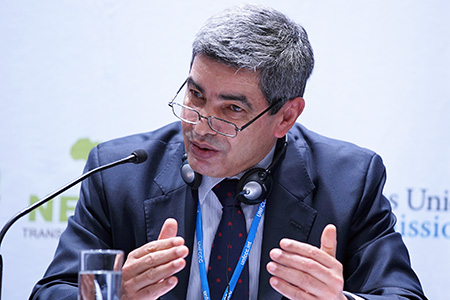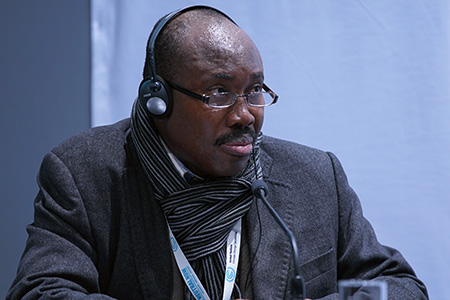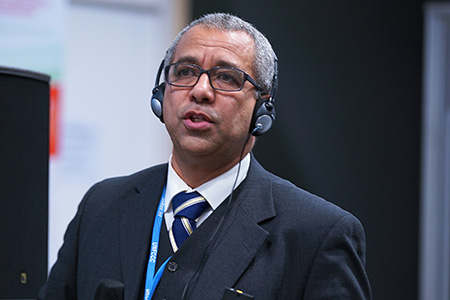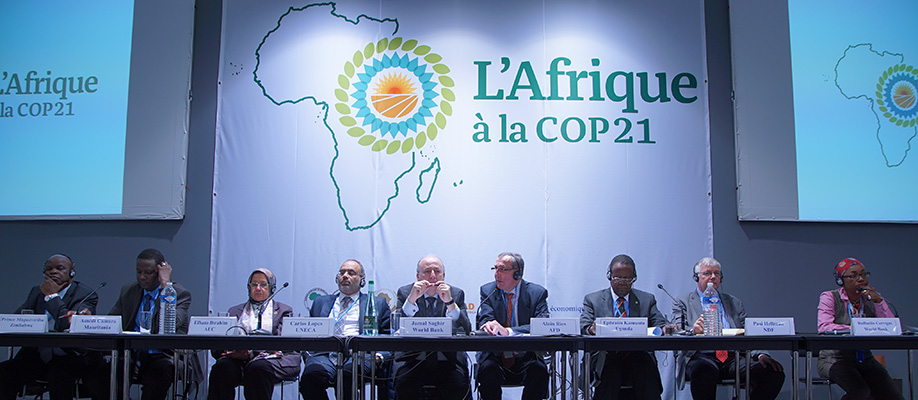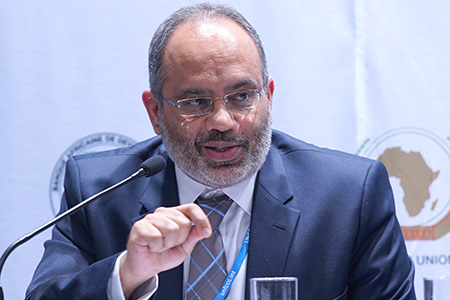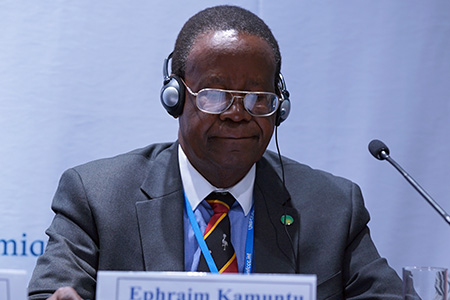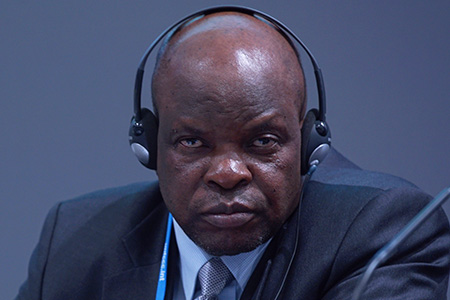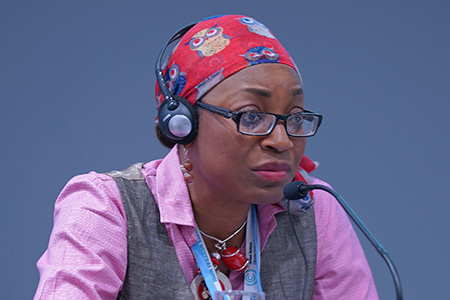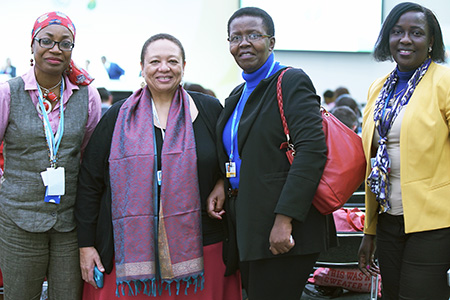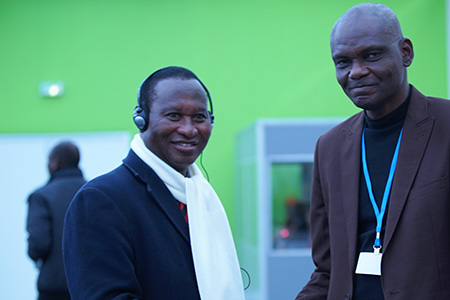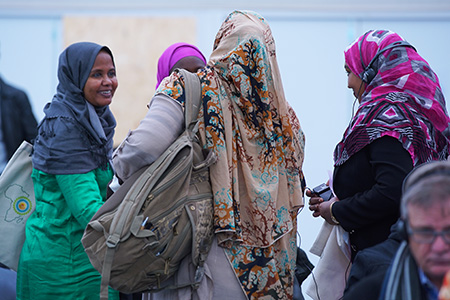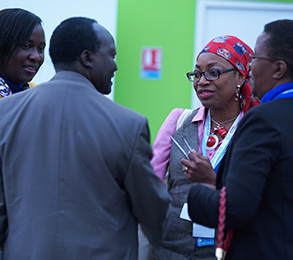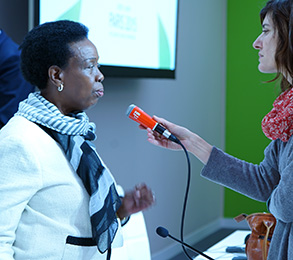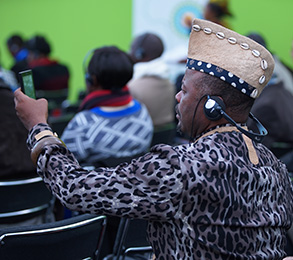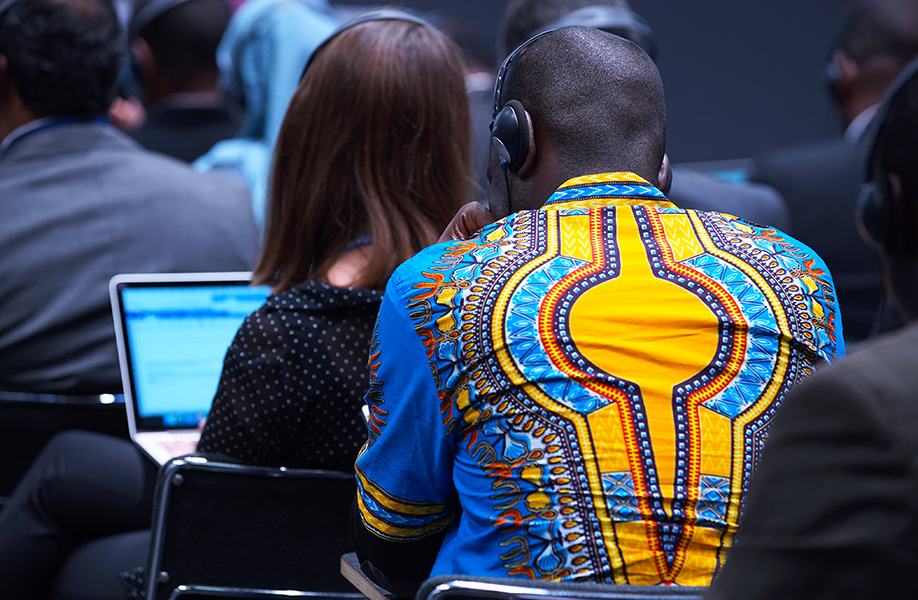Language:ENGLISH | FRANÇAIS |
||
Receive ENB+ Meeting Reports |
||
|
Receive our ENB+ bulletins and reports by email: |
||

| Follow @enbclimate | ||

Loading... |
||
|
Receive emailed updates with the news articles above plus related information and announcements from our CLIMATE-L community mailing list: |
||
|
The following side events were covered by ENB+ on Tuesday, 8 December 2015:
|
||
|
IISD Reporting Services, through its ENB+ Meeting Coverage, is providing web coverage, including photos and video, of selected events from the Africa Pavilion at COP 21. | ||
Intended Nationally Determined Contributions (INDCs): Implications,
Prospects and Africa’s Readiness to Contribute to Solutions
Presented by: UN Economic Commission for Africa (UNECA)
This high level side event, part of Africa Day at COP 21, was organized to showcase Africa’s contributions toward finding sustainable solutions to the threats posed by climate change. The session provided a platform to debate the challenges, opportunities and means of implementing the INDCs in African countries. Lasting from 11:30 a.m. until 2 p.m., the side event was divided into multiple sessions: an opening session; a session on the status of INDCs; a ministerial dialogue on INDCs in Africa; and a session on the implications and prospects of the INDCs for Africa. The opening session was moderated and chaired by Shiferaw Teklemariam, Minister of Environment, Forest and Climate Change, Ethiopia. |
||
Tumusiime Rhoda Peace, Commissioner for Rural Economy and Agriculture, AUC, said Africa Day is organized by Africa’s “premiere institutions” including the AUC, AfDB, UNECA and the New Partnership for Africa’s Development (NEPAD), in collaboration with ECA, Ethiopia, Sudan and with the support of other partners. She called COP 21 a “historic milestone” that proves the level of commitment by the global community in addressing the impacts of climate change. Africa Day, she said, is not about lamenting risks or challenges but is an opportunity for the continent to show solutions, specifically through the development of the INDCs. Carlos Lopes, Executive Secretary, UNECA, said that Africa has arrived in Paris with a strong message: the continent is here to be part of the solution to climate change. He noted that following COP 20 in Lima and the renewed call for Parties to the UNFCCC to submit their INDCs, 53 of the 54 African countries successfully prepared and submitted their INDCs to meet the objectives of Article 2 of the Convention. He said, however, that INDCs are “a deviation in some degree” from a process that “should be more linked to monitoring and constraints” and that INDCs are risky because they can “blur the picture” with regards to the principle of common but differentiated responsibilities (CBDR). He said that sustainable development is often approached in a fragmented manner, with the pillars of society and the environment suffering in favor of economic considerations. He said contributions from developed countries should include finance, technology and capacity building. Concluding his remarks he reminded participants of the example of China, asking what will happen when China delocalizes its production to some other region, such as Africa: “is this the industrialization we want?” Anthony Nyong, Manager, Compliance and Safeguards Division, AfDB, said Africa is positioned to transition to a low carbon, climate resilient economy and called it “very important” for delegates in Paris to reach an agreement to keep global temperature rise below 1.5 degrees Celsius. He said African countries have arrived in Paris with concrete solutions outlined in their INDCs that are among the most ambitious in the world. “Africa cannot do it alone,” he said, and called for respect of the principle of CBDR and concrete means of implementation. The INDCs, he said, “should not be relegated to the archives of the UNFCCC.” He ended by underscoring that when Africa suffers from climate change, the entire world suffers. Richard Sezibera, Secretary General, EAC, said although climate change will inevitably cause challenges to Africa’s growth, it also provides an opportunity for the continent to grow faster and cleaner and for Africa to “develop her own capacity for industrialization.” The development of INDCs in East Africa, he said, included both technical and political processes and that the INDCs are anchored in extant national climate change adaptation programmes and plans. He said climate change is too important and pervasive to be left up to individual nations to tackle, and he stressed the role of partnerships and maintaining clear separation between climate finance and official development assistance. Khaled Fahmy, Minister of Environment, Egypt, and President, AMCEN, said the first “red line” for African negotiators in Paris is preserving an equal balance between adaptation and mitigation. He went on to outline a second red line, which is that African countries have not come to Paris to reinterpret the Convention but rather to operationalize it. He said the outcome from Paris should be fair, legally binding, based on historic responsibilities and aimed at limiting global temperature rise to 1.5 degrees Celsius. |
||
|
|
Following the opening session, participants listened to two statements on the status of INDCs in Africa. Xolisa Ngwadla, Lead Negotiator, AGN, underscored the importance of including both adaptation and mitigation in INDCs. He detailed the process by which African negotiators worked to ensure that the guidelines for preparing INDCs had an adaptation component. He noted capacity constraints among some countries, particularly small island developing states (SIDS). On finance, he lamented that the Paris outcome is unlikely to have finance reflected in the context of INDCs but that the AGN continues to push hard on this “critical element.” Johnson Nkem, Senior Adaptation Officer, UNECA, presented on patterns among African INDCs. On the aggregate, adaptation plans as contained in the African INDCs require 58% conditional financing while mitigation plans require 66% conditional financing, a fact that underscores the need for means of implementation in the Paris outcome. Using the examples of Namibia, Chad and Central African Republic, he explained the manifold benefits that means of implementation would bring to achieving the INDCs over a business as usual scenario. He noted a strong synergy between adaptation and mitigation because adaptation interventions help to lift up the level of concomitant mitigation activities. |
||
|
|
|
|
|
|
|
|
Following the end of the status of INDCs segment, Cherif Rahmani, Minister of Planning and Environment, Algeria, opened the Ministerial Dialogue on INDCs in Africa. Adamou Chaiffou, Minister of Environment, Niger, said that his country is one of the least responsible for climate change but is suffering the most, particularly from desertification. He underscored the need for an emphasis on adaptation, which in the context of Niger means sustainable land management, climate-smart agriculture and improving the resilience of populations and ecosystems. He urged that the Paris outcome be legally binding and noted the need for external support. Pohamba Shifeta, Minister of Environment and Tourism, Namibia, said his country is trying to curb emissions and lead by example in the fight against climate change. He highlighted important issues as food and water security, drought-proofing and climate-smart agriculture. Namibia’s INDC has a 15 year implementation period from 2016-2030, he said, and will require approximately US$33 billion to reach its mandate. He expressed hope that developed countries will fulfill their commitment to support INDCs with the necessary means of implementation. Cherif Rahmani said Algeria is leading the way but ambitions have to be realistic in light of financial and technological challenges. He underscored the need for human resources and capacity building as well as for a commitment to the means of implementation and upholding the principle of CBDR. The challenge of desertification, he said, is more pervasive than ever and there is a need to strengthen the resilience of populations, particularly among agro-pastoralists. |
||
|
|
|
|
|
|||||||||||
|
|
|
|
|
||||
Other Events
Advancing Low Carbon Development in the West African RegionPresented by: The Economic Community of West African States (ECOWAS) and Centre for Renewable Energy and Energy Efficiency (ECREEE)
|
|
|
|
This panel discussed advancing low carbon development in West Africa and was moderated by Youba Sokona, Special Advisor on Sustainable Development, South Centre. |
||
|
||||
Building Resilience to Climate Change in African SIDS: Implementation of the S.A.M.O.A. Pathway Presented by: UN Economic Commission for Africa (UNECA)
|
|
|
During this session, panelists discussed the ways in which countries are implementing the S.A.M.O.A. Pathway in African SIDS. Carlos Lopes, Executive Secretary, UNECA, said there is “absolutely universal agreement” on the challenges facing SIDS. He said the support for SIDS expressed in Samoa during the Third International Conference on SIDS (the Apia Conference) was “uncontroversial” and there was agreement even before delegates arrived. Grappling with entrenched poverty and food, water and energy insecurity is made more difficult due to climate change, he said, calling it an injustice. Fernando Wahnon, Permanent Representative of Cape Verde to the UN, said SIDS’ ambition to combat climate change is completely different than that of large, continental countries. The Apia Conference, he said, was important for drawing attention to the special case of SIDS but that what is needed now is implementation. He said although SIDS are comprised of 48 countries, they are small, have little political power and are suffering the effects of climate change already. The S.A.M.O.A. Pathway, he said, is important because it focuses on sustainable and clean energy. He closed his remarks by lauding SDG 14 on oceans saying, “the sea is the life of the islands, and life for humanity.” Olafur Rognvaldsson, University of Bergen, described the importance of high resolution weather forecasting and data processing for SIDS. He urged involving the private sector so that it understands the value of meteorological information and suggested engaging with the insurance and reinsurance industries and the energy and agricultural sectors. Jose Pimenta, Director, CIICLAA, introduced the CIICLAA and its objectives of: supporting decision making on extreme weather and climate adaptation; conducting applied research for food security, geosciences and disaster risk reduction; providing advanced specialized training; and involving the private sector. Carlos Lopes closed the session noting that vulnerability in SIDS needs to be approached from a scientific point of view and underscoring the importance of inserting the S.A.M.O.A. Pathway implementation into the UNFCCC negotiations. |
||
|
|
|
||||
Climate-proofing Africa’s Long-term Assets: Presenting the Africa Climate Resilient Investment Facility Presented by: World Bank
|
|
|
This event showcased the Africa Climate Resilient Investment Facility and was moderated by Fatima Denton, Director, Special Initiatives Division, UNECA. |
||
|
|
|
||||
Around the Venue
|
|
|
|
|
|
|
|
The Africa Pavilion @ COP 21 Bulletin © <enb@iisd.org> is a special publication of the International Institute for Sustainable Development (IISD). This issue has been written by Dina Hestad and Brett Wertz. The Digital Editor is Liz Rubin. The Editor is Tomilola Akanle Eni-ibukun, Ph.D. <tomilola@iisd.org>. The Director of IISD Reporting Services is Langston James “Kimo” Goree VI <kimo@iisd.org>. Funding for coverage of the Africa Pavilion at COP 21 has been provided by the UN Economic Commission for Africa (UNECA). The opinions expressed in the Bulletin are those of the authors and do not necessarily reflect the views of IISD and funders. Excerpts from the Bulletin may be used in non-commercial publications only with appropriate academic citation. For permission to use this material in commercial publications, contact the Director of IISD Reporting Services at <kimo@iisd.org>. Electronic versions of issues of the Africa Pavilion @ COP 21 Bulletin can be found on the IISD Reporting Services website at http://enb.iisd.org/climate/cop21/cdafrica-ap/. The IISD team at the Africa Pavilion at COP 21 can be contacted by e-mail at <brett@iisd.org>. |
||
